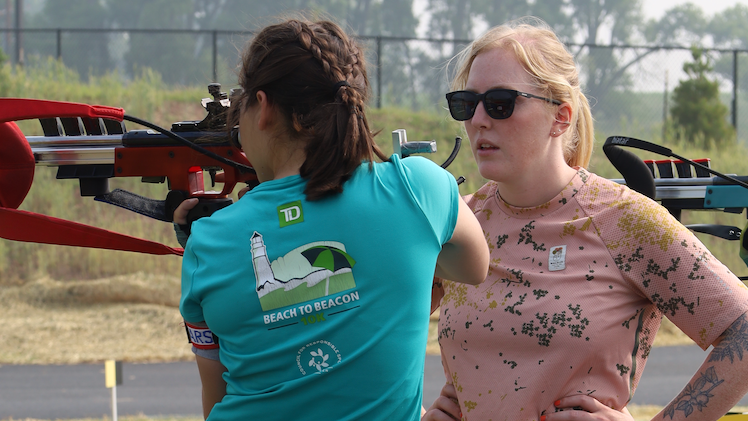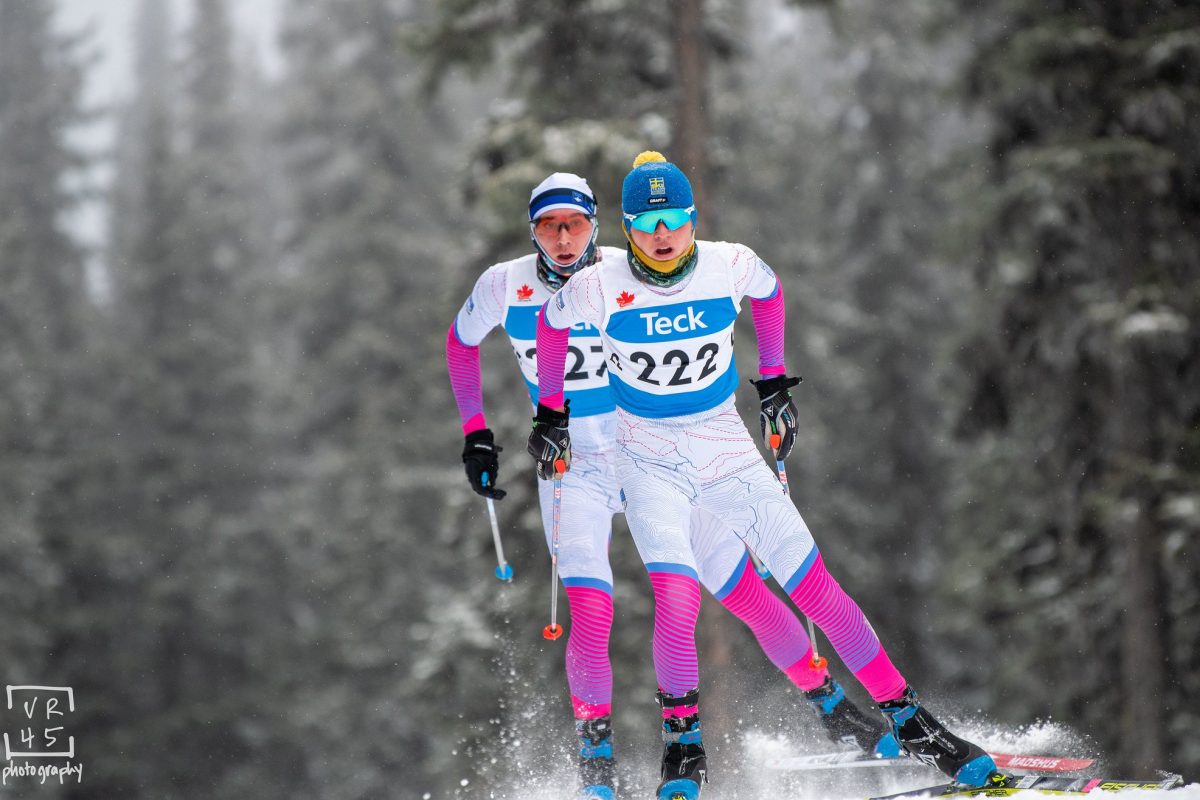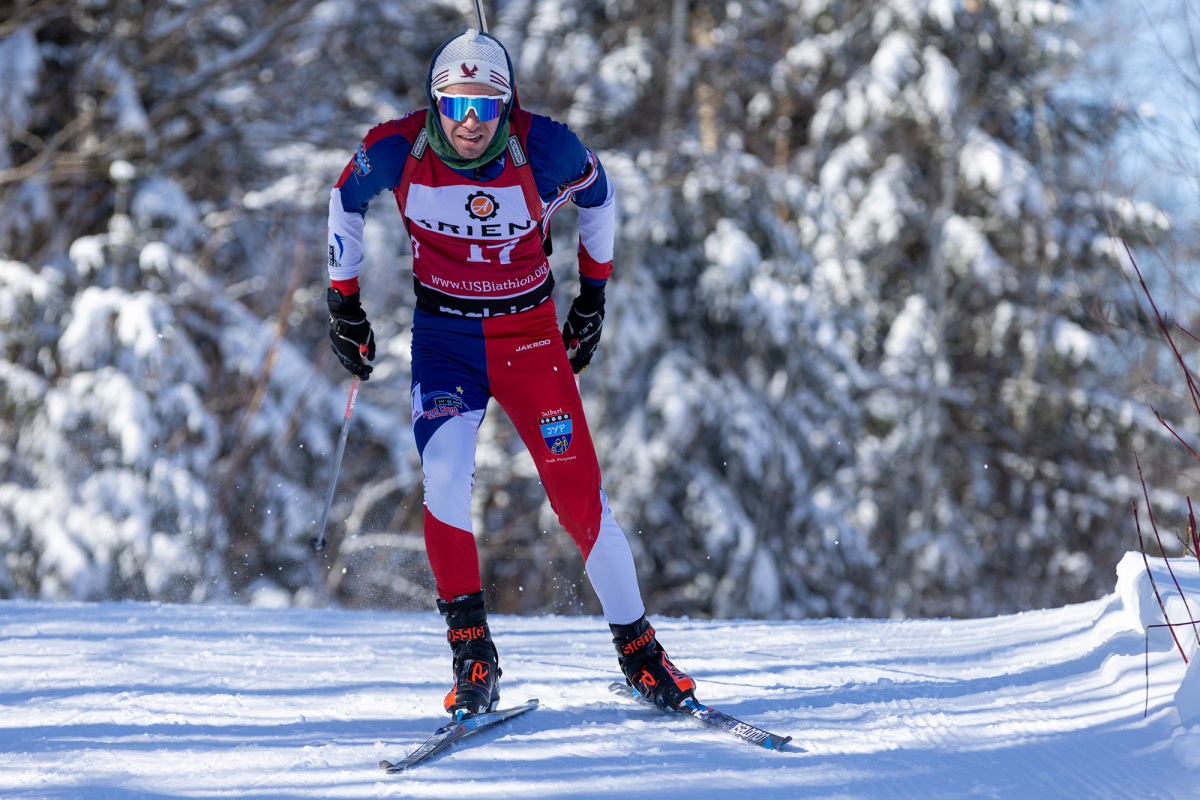
When Tim Burke finished tenth and Susan Dunklee fifth at IBU World Championships in Ruhpolding, Germany in March, U.S. Biathlon Association President and CEO Max Cobb was on the range watching.
But it didn’t mean that he could hurry over to the finish and congratulate them. Talk about wearing many hats: Cobb was the TD (technical delegate) for the race, overseeing dozens of other volunteers and shouldering the responsibility of ensuring a fair field of play.
A well-versed technical delegate (TD), he has overseen races at venues around the world, including working as the Chief of Competition at the 2002 Olympics in Soldier Hollow. Those experiences came in handy as this World Championships was not an easy one. Not only did the races draw a total of over 200,000 people, but the busiest day of competition included 250 racers. The series also featured sloppy conditions, warm temperatures, course closures, and seeding changes. On the first day alone, Cobb appeared twice in press conferences, once to discuss the decision to salt the course and a second time to explain a target malfunction.
On the ground in Ruhpolding, FasterSkier managed to snag Cobb while he was taking a break from his many duties at the competition and discuss what goes on behind the scenes at biathlon’s biggest races.
FasterSkier: You TD a World Cup every year, at least one, right?
Max Cobb: This is my fourth assignment this season. So my third time as a TD, and I was a referee for start and finish in Holmenkollen. Usually I’m involved in about three races as a TD at World Cup or World Championship events in a season.
FS: Is that a normal workload for officials?
MC: It’s usually two, but I’m chairman of the Technical Committee, so usually the chairman has more duties. And it’s a little bit extra for me because all the events are normally in Europe, so it’s good when I can be at three events, and then maybe come to a fourth one without an assignment – but at least be present to talk with people.
One of my duties as chairman is to be the ‘trainer liaison’. So I talk with the coaches to get their feedback and try to take that into consideration as we put together the schedule, or look at rule changes and that kind of thing. It’s important to have contact with them throughout the season.
This year has been really good: I had one assignment each month. It’s kind of a lot, but it’s been fine.
FS: This is so much bigger than a World Cup. What’s the difference to be a TD here?
MC: There are some differences, but the fundamentals are all the same. The competition is the same, the courses are the same. Of course, the infrastructure that’s going on behind it all, for instance the needs of the broadcasters and the fact that we’re having eleven competitions in a week where normally we would have six – it’s like two back-to-back World Cup weeks.
FS: Is that stuff you have to think about, or is that just in the hands of the Organizing Committee?
MC: I’m really separated from the Organizing Committee. The TD’s work is really central to the field of play and the experience that the teams have. Those are the things that I need to take care of. All of the spectator services, and transport, and media, those things are all managed by the Organizing Committee.
Of course, the TV is a big player, so they are really important partners for us there. But that’s been going really well for the last two years. We haven’t had any big issues with the broadcasters.
(continued below)

FS: I guess the other difference here is that there is a bigger field, both with more people and a broader range of ability levels. Does that affect decisions?
MC: Yes. Here, that had a pretty significant effect because we have probably the most challenging downhill on the entire World Cup circuit, and then the conditions were really difficult with it being soft, and there’s really no way to rake that particular downhill during the competition. You can’t see the athletes soon enough to be able to jump out of the way. So in the end we had to make the decision to change the course.
I think it was definitely the right decision, but that’s never easy to do during the championships. We really had some problems during the zeroing period when they weren’t keeping the deep snow off of it, and some athletes fell. Even Tim Burke, who is an extraordinarily good skier. You have to maintain a corner like that, and there was no good way to do it.
So, yes. Those kinds of considerations definitely play in, and we have to manage the situation for a larger field.
FS: How did you react to the shooting problem in the mixed relay? [Note: a target malfunctioned for Norway’s Ole Einar Bjørndalen, causing him to ski an unnecessary penalty loop. Norway received a time bonus and won gold even though Slovenia crossed the line well in front.]
MC: Luckily, I have some experience with those kinds of situations both at national events and even at international events, where for whatever reason the target doesn’t seem to be working right. Our rules are super clear about it. You close the firing point and try to make whatever observations you can, for instance whether it was a malfunction, and then if it was you have to calculate the time credit for the athlete.
So I can say that there were no issues in figuring those things out. Of course something that affects the medal place in a head-to-head competition is just an awful, awful position to be in. The rules are clear so there was no other way to resolve the situation, but it’s just terrible when the team that comes over the line first don’t end up being the winners.
We tried to work as quickly as possible. It happened in the third leg, and we tried to make sure that all the teams were informed so that they could tell their athletes and they could do whatever they needed to do out on the course. So that information got out, and it got out to the broadcasters, and I think we really worked very quickly to resolve things. But it’s really something you wish would never happen, especially at the World Championships.
(continued below)

FS: What’s the worst error or problem you’ve had to deal with as a TD?
MC: Oh boy. [laughs]
You know, we had a really bad situation in Vancouver where the starts got messed up for the pursuit. I wasn’t directly involved in that, but I think it was probably the most serious situation that we had from a technical standpoint in the last eight years. That’s very, very difficult to resolve. I mean, you can figure out what the time differences were, but because it’s a head-to-head competition and it’s tactical, it’s really hard to put Humpty Dumpty back together again.
So we’ve changed the rules around that, too, so that the athletes have to start themselves, and if they go too early then they get a penalty. I think that’s a much better solution.
FS: Do the athletes like that?
MC: They’re fine with it, and we really had no problems, at least this season. Last season was the first time we used it and we had a couple of problems with people in the back of the pack jumping the gun a little bit, but this season I don’t think there’s been a single time penalty. So that’s good.
You know, the other hard thing is when bad weather comes in in the middle of a competition and we have to call it off.
FS: It seems like there have been a lot of tough weather races this season.
MC: None that we had to call off, but yeah, we had to think about it.
In Nagano during the Olympics, we had a race where the snow falling out of the trees was so strong that you couldn’t see the targets and we had to call it off. We’ve had World Cups where the fog has come in and you couldn’t see the targets. And we had World Championships in Östersund in 2008, I was the TD there, and we had a really, really windy day where trees and flagpoles were falling down, and we had to postpone the start until the next day to make sure that a tree didn’t fall down on the course in the middle of the race.
So the stormy days are tough. They’re tough on the athletes and also tough on the technical officials, because a lot of times it’s almost a whiteout – officially you can’t even see what’s going on!
FS: So if something else did go wrong, you wouldn’t be able to deal with it.
MC: It would take a lot longer to react. So that’s always hard.
FS: Here, you decided to change the seeding structure. Can you talk about that?
MC: Sure. We knew already, last year, that it could be… that the weather is difficult here. We have a much smaller field racing on the World Cup on a regular basis. So we came up with a rule that would allow the jury to create a different seeding and grouping system for the World Championships if the weather was bad, and the jury decided to enact that in all the individual-start competitions we had here. I think it was the right thing to do, to keep the athletes that have earned that top ranking in the World Cup together.
And that’s what the athletes and the coaches all said – that we don’t care if it’s not the best conditions, but we want even conditions with our competitors.
(continued below)

FS: Do you think that having you, as an American, involved in the sport at such a high level has been a benefit for the U.S. program? To have you within the IBU?
MC: It’s hard to say. I think that the advancements in the U.S. program on the sports side have been completely due to the great staff that we have, and the athletes. I think we get a little bit of credibility for me being in this function, that we’re good partners with the international organization. And obviously the majority of events take place in Europe, and so I think it’s nice when we’re involved in that way because then we’re really partners.
FS: You’re not just showing up.
MC: Exactly. So I think that’s been positive. But I think the team and all the performances there, that’s the athletes and the staff. If I was or wasn’t involved in the technical side, they’d still be where they are.
FS: How do you do two jobs?
MC: Ha! Ha ha ha! [laughs, a lot]
FS: Ha, ha…
MC: That’s a little rougher.
All of the people who are in my position as TD’s, we’re all volunteers. We get 35 Euros a day for expenses, and our travel is all covered and so forth. And really, the stuff we do during the wintertime, I’m fortunate to have it as part of my responsibilities with working with U.S. Biathlon. It’s not like I have to take vacation in order to be there. At the U.S. Biathlon level and at the Olympic Committee level they recognize that an important of a national federation’s duties is working within the international federation.
But by the time April comes, I’m really ready for a break. The hardest part is personal, just to be away from the family that much.
It’s working out okay.




One comment
zimborst
April 12, 2012 at 9:12 pm
Max, you’re a hero for your contributions to biathlon at all levels! Thanks for doing the thankless work so essential to make the sport possible. All the best, John Borstelmann